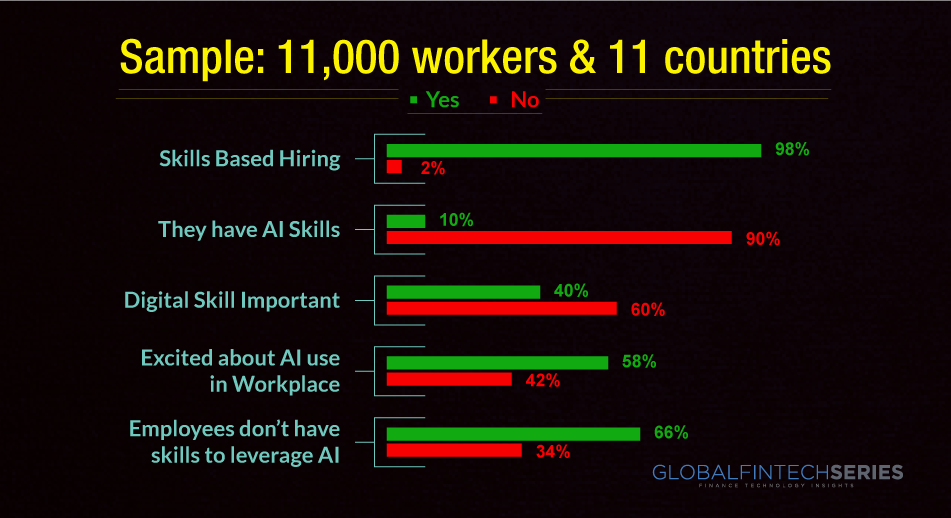This article examines the full poll results, which were gathered from more than 11,000 employees in 11 countries, and it presents fresh information on how the workforce views the role that generative AI will play in jobs of the present and the future.
Emerging AI Technologies Like Generative AI Are Exciting For Workers.
What really is good news? Workers don’t seem to be as concerned about how developing technologies might change occupations of the future as much as they are excited about it. This indicates that companies might assist bridge the digital skills gap by offering ongoing, skills-based training to their employees, especially in light of the workers’ indicated willingness to learn new abilities. Contrarily, workers believe that app development and artificial intelligence (AI) are currently the most in-demand and fastest-growing abilities, despite being among the least utilized in workers’ day-to-day roles.
Read the latest article: 10 Best Applications Of AI In Banking
Both Managers And Employees Acknowledge That AI Skills Are Necessary.
- Sixty percent of workers worldwide expressed enthusiasm for the idea of adopting generative AI in their employment. In fact, more people (58%) expressed excitement about using it at work than concern (42%) that it will replace them.
- Around the world, 67% of persons in leadership positions claim that their organization is looking into using generative AI.

- Only 1 in 10 workers claim that their present employment involves AI, despite how important it will be to their future skill set.
- Despite this enthusiasm, a recent study reveals that while over half of senior IT leaders in the United States claim that their company is actively employing or experimenting with generative AI, 66% claim that their workforce lacks the skills to effectively utilize the technology.
- A corporate benefit of skills-based hiring is talent retention, according to 56% of people leaders. Knowledge sharing (46%) and increased employee diversity (48%) were also highly rated.
- The majority of human resource managers also think that emphasizing employees’ digital skill development will boost overall corporate performance, citing greater productivity (47%), better team performance (43%), and 40% better problem-solving skills.
An International Trend Towards Skill-based Hiring
- At all levels, there has been a shift towards hiring on the basis of skills. The majority of people leaders polled (82%) agreed that when evaluating recruits, skills are the most major element. Only 18% of respondents indicated that specialized degrees are necessary.
Read: A Global Map Of Cryptocurrency Regulations
- In order to get a job in the market today, 84% of worldwide workers believe that experience with skills is more vital than a degree. Yet, there is a mismatch between the talents that employers are looking for and the ones that the workforce is now employing. Only a small percentage of global workers—4 in 5—report having abilities beyond collaboration technologies, digital administration, and digital project management.
Workplace Skills Lag As Needs Change.
- Wide areas of these disruptive innovations call for upskilling. Data security capabilities (60%), ethical AI and automation skills (58%), and programming skills (57%) will all be more valued in the workplace as a result of the advent of AI and automation, according to people managers.
- People managers ranked creative thinking skills (56%), customer connection skills (53%), and leadership skills (51%) as the top three “soft” talents that will likely become more crucial as a result.
- Only 14% of respondents believe that other, related digital skills like encryption and cyber security are used in their position and only 13% state that they employ coding and app development abilities.
- The technology sector is the one that scores the highest in terms of AI capabilities, yet even within this sector, just 27% of workers now use AI in their jobs. Less than 10% of individuals in healthcare (8%) and the public sector (6%) report using AI capabilities in their day-to-day work, which is even lower outside of traditional IT roles. The future is in upskilling. Global workers are almost unanimous (97%) in their belief that organizations should give priority to AI skills in their employee development plans.
- Companies looking to increase the use of future technologies and emphasize skills-based hiring are fortunate in that workers are motivated to broaden their existing set of digital abilities. Nine out of ten people think that organizations should prioritize their employees’ digital skill development.
Read: The New Digital Mobile Banking Sphere
